The Young Messiah
 for some violence, disturbing images and thematic elements.
for some violence, disturbing images and thematic elements.
Reviewed by: David Criswell, Ph.D.
CONTRIBUTOR
| Moral Rating: | Offensive |
| Moviemaking Quality: |
|
| Primary Audience: | Family Adults |
| Genre: | Fantasy Drama Adaptation |
| Length: | 1 hr. 51 min. |
| Year of Release: | 2016 |
| USA Release: |
March 11, 2016 (wide—1,600+ theaters) DVD: June 14, 2016 |


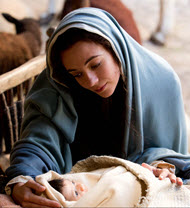
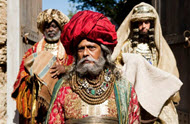
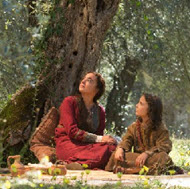
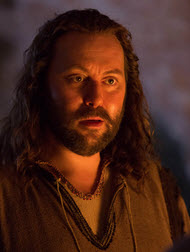
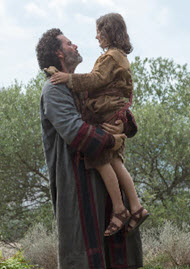
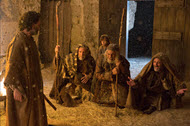
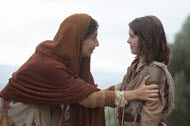
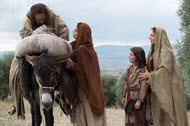
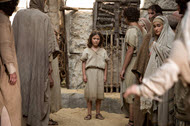
Is it okay to make up fictional stories about Jesus Christ, the Son of God? Is it okay to put fictional words in His mouth?
What does the title Messiah mean?
Was Jesus Christ only a legend? Answer
Is Jesus Christ a man, or is he God? Answer
If Jesus is God, how could he die? If Jesus died on the cross, then how can he be alive today? Answer
Was Jesus Christ God, manifest in human form? Answer
Is Jesus Christ really God? Answer
If Jesus was the Son of God, why did He call Himself the Son of Man? Answer
TRINITY—How can one God be three persons? Answer
JESUS’ CHARACTER—Is Christ’s character consistent with his high claims? Answer
Could Christ have sinned? Answer
The virgin birth
Isn't the virgin birth of Jesus Christ mythological and scientifically impossible? Answer
| Featuring |
|---|
|
Sean Bean … Severus Adam Greaves-Neal … Jesus Vincent Walsh … Joseph Sara Lazzaro … Mary David Bradley … Old Rabbi Jonathan Bailey … Herod Lee Boardman … Roman Squad Leader David Burke … Blind Rabbi Rory Keenan … The Demon Christian McKay … Cleopas Isabelle Adriani … Seleni See all » |
| Director |
| Cyrus Nowrasteh — “The Stoning of Soraya M.” (2008), “The Day Reagan Was Shot” (2001—TV) |
| Producer |
|
1492 Pictures CJ Entertainment See all » |
| Distributor |
Nearly complete fiction
“The Young Messiah” is an enigma of a “Christian” film. It has earned high praise from many Christian reviews including Ted Baehr’s MovieGuide and Focus on the Family, yet it is based on the book Christ the Lord: Out of Egypt written by Anne Rice who became famous for her Vampire erotica novels and who recently called herself a “secular humanist.”
Anne Rice was a Catholic at the time she wrote the books. In fact, to this day her real religious beliefs are enigmatic, for she claimed inspiration from Gnostic gospels when writing the book, later renounced Catholicism and organized religion for its opposition to Gay marriage, called herself a Secular Humanist, but recently professed her “love” for Jesus while promoting the film.
So what are we to make of “The Young Messiah”? Let me begin with full disclosure that I have not read the book. I do not know how much of the novel was altered to appeal more to mainstream Christian audiences, and I do not know how much gnosticism found its way into her book. My review is strictly based on the film.
“The Young Messiah” is about Jesus as a seven year old child. It is a completely fictional account which claims to be consistent with Biblical and historical research. It begins with a seven year old Jesus in Egypt who is attacked by bullies. When one of the boys accidentally dies, Jesus is blamed. Jesus then resurrects the boy, only to be accused of witchcraft. As Mary, Joseph, Jesus, his uncle Cleopas, and cousin James begin the journey back to Nazareth following the death of Herod, they are hunted by a Roman soldier named Severus who is still trying to find and kill the child he missed in Bethlehem years earlier.
In the film, Jesus does not know who He is and does not understand the “powers” that He possesses. He is seeking answers, but Joseph and Mary are reluctant to tell Him, since He is but a child. Now, as I have done with similar films, it is best to break the film down into its entertainment value, historical value, and Biblical accuracy, as well as other causes of concern for parents, so let’s begin.
Entertainment Value
While many Christians are praising the film, I frankly found the film only slightly entertaining. It was technically well done, with fine acting and cinematography, but the pace makes the film somewhat boring, and there is no way to get around the fact that the film is terribly predictable. Obviously, we never for a half a second believe that Severus (admirably played by Sean Bean) will actually kill Jesus. There is zero suspense in the subplot of the assassination of Jesus, and it contains several historical and Biblical blunders. The main story of Jesus seeking to understand who He is also lacks heart (ignoring, for the time being, the Biblical problems). Only Cleopas (played by Christian McKay) brings any charm, wit, or charisma to the family. The rest plays out as interesting, but contrived.
If the film were about the baby Buddha or a young Saint Jerome, it is unlikely that it would find an audience at all, for the film is simply not that strong. The appeal is of Jesus Himself and our own curiosity as to what our Savior was like as a child, but beyond this premise itself, the film lacks heart and soul.
Historical Inccuracy
For a movie which boasts of being “rooted in history” there are several major blunders, as well as numerous smaller and less mportant ones. The most glaring historical blunder is supposed to be the climax of the film when Severus casually wanders into the Temple of Jerusalem! Later, many soldiers storm into the Temple, and there is little more than a skirmish.
In fact, while Gentiles were allowed in the “outer courtyard” of the Temple, no Gentile was ever permitted to step foot inside the Temple itself. Had a Roman soldier stepped foot in the Temple, it would literally have started a riot. Indeed, many riots were started over far less.
Another glaring inaccuracy is the fact that the film portrays Jesus as having lived in Egypt for seven years before the death of Herod the Great. However, we know that Herod died in 4 B.C. Traditional dating has Jesus born December 25, 5 B.C., indicating that they were only hiding in Egypt for a few months to a year at most. Nevertheless, there are those who believe Jesus was born earlier. Some say as early as 7 B.C., but no one believes Jesus was born in 11 B.C. He would have been in his mid-forties when He died, despite the Bible clearly describing His ministry as beginning when He was in His early 30s (Luke 3:23).
Is this a big deal? Perhaps not, but it does beg the question as to how “rooted in history” the film is. Would a Roman centurion really be taking orders from Herod Archelaus? Why do the hair styles of the Jews look medieval?
Now I concede that with the glaring exception of Severus in the Temple many of these points do not effect the entertainment value of the film, and most Hollywood “Biblical” films have even less historical accuracy. “Prince of Egypt” is one of my favorite movies, but portrays the Exodus in the wrong time, with the wrong Pharaoh, with Moses as a forty year old at the time of the Exodus, and many other historical and Biblical errors, so I will not condemn “The Young Messiah” for such historical blunders. Biblical accuracy, however, is a far more important standard. Let us look at that.
Biblical Inaccuracy
“The Young Messiah” is not truly consistent with Biblical teachings. The most obvious is the fact that Jesus does not know who He is. He does not understand His powers, and does not realize that He is the Son of God. While some Christians have pointed to Luke 2:52 to imply that Jesus naturally had to grow and learn like all other children, there is a profound difference in Jesus needing to develop His human brain, and in His consciousness and soul.
John 1:14 makes clear that “the Word became flesh and dwelled among us.” How could God not know who He was? How could Jesus’s consciousness be unaware? True, He was living in the body of a child and his brain needed to develop as with all children, but, at His core, He would surely have known who He was and what His purpose was, yet at the end of the movie the young Jesus professes that He does not know why He is here and that He is just to experience everything.
This teaching was doubtless borrowed from the heretical false gospel entitled The Infancy Gospel of Thomas which Anne Rice openly admitted to having used as a source material. But this is not the only part of her book borrowed from this phony “gospel.”
There is a scene in the film where Jesus is wrongly accused of having murdered a kid who was bullying Him. When Jesus resurrects the child, the boy immediately attacks Jesus! This scene is wrong on so many levels. Never mind that the Bible seems to imply that Jesus changing water into wine was His first miracle (John 2:3-11), the action of the resurrected boy feels more like demon possession than the gratitude of a resurrected boy. The story itself seems inspired by the same The Infancy Gospelof Thomas in which Jesus cursed to death a young boy who had bothered Him.
Interestingly enough, Jesus is not the only one portrayed inaccurately. Satan plays a prominent role in the film as a sort of ghost who is constantly haunting the young Jesus, and yet Satan does not seem to know who Jesus is either. Satan only knows that Jesus is important, but does not realize how important. In one scene, Satan (who is portrayed as a blond haired, blue eyed man) takes Jesus to a mountain top overlooking Jerusalem and tempts the young Jesus, much as Satan tempted Jesus in Matthew 4.
It is worth noting that in the Bible it is stated that Satan’s wrath is great because he knows his time is short (Revelation 12:12). Far too many films portray history as a chess match between God and Satan, as if Satan thinks he can win, but Satan knew he was doomed the day he fell from Heaven. That is why his purpose is not to “win” but to drag as many of us down to Hell with him as possible. It is jealousy and pride that made Satan fall, and those are the very same traits that make him so hateful and vindictive. His fate was sealed long ago. The Cross sealed that fate, but Satan is no fool.
“The devil has come down to you, having great wrath, knowing that he has only a short time. “(Revelation 12:12).
Now there are other lesser Biblical inaccuracies (Mary was only 14 when she got married? 17 maybe, but not 14), but as I have pointed out, I have given great leeway to films like “Prince of Egypt,” so should I not give the same benefit of the doubt to “The Young Messiah”? Yes and no. The depiction of the devil is all too popular, if inaccurate, but forgivable.
The portrayal of the young Jesus performing many miracles is also inaccurate, but forgivable. What is less so is the subtle (and therefore more dangerous) inspiration from The Infancy Gospel of Thomas including the myth that Jesus did not know why He was on Earth or who He truly was. Evangelicals all agree that Jesus was 100% human and therefore suffered the same human frailties as us all, but He was also 100% God and therefore His consciousness would surely have known His own identity and purpose in life.
It is worthwhile to ponder at what a young Jesus was like, and it is for that reason Luke included anecdotes related to him by Mary in his gospel (Luke 2:40-52), but any speculation must be Biblically based and not based on conjecture by gnostic or mystic gospels. It is clear that Anne Rice’s story borrows heavily from the mystical view of Jesus rather than the Biblical one.
Concerns for Parents
Ignoring the Biblical issues, there are concerns for young children. While there is little direct graphic violence, there are scenes where we see many people crucified or killed by the sword. In one scene Jesus, Joseph, and Mary must walk down a road where people were crucified all along the roadside (which was done by Romans to scare the populous into submission).
Many such scenes do take place, but the most disturbing scene is of an attempted rape. A man grabs a woman and throws her down to the ground, where he attempts to rape her. It is at this point that I saw a family get up and leave the theater (I saw the film with a Baptist church group). Thus, families should be warned that the film does contain scenes of violence which, while not graphic, are disturbing and not appropriate for young children.
Summary
“The Young Messiah” is earning praise from some Christian audiences, but I feel that much of this praise is simply because we have been hungry for Christian films. “The Young Messiah” is a film that is mostly respectful of the Christian tradition and does not deny that Jesus was the Son of God or that Mary was a virgin, and thus has filled a void which many Christians have been seeking, but I would recommend the movie “Risen” for those audiences. While not wholly accurate itself, and also speculative of history, it is more consistent with the Bible and history than “The Young Messiah,” more uplifting, and more exciting.
I feel that “The Young Messiah” is being overrated by Christian critics. I cannot whole heartedly recommend the movie.
Is it an extremely blasphemous film, like “Noah”? No. Is it a Biblical film? Sadly, no.
Go see “Risen” instead. If you do choose to go see it, please make sure your children understand that when God became man, He did not cease to be God. He knew who He was, but He was subject to the same infirmities, sorrows, and trials as every human being. He understands our sufferings and temptations, because He Himself suffered and was tempted (Hebrews 2:18).
Violence: Moderate to heavy / Profanity: Minor—“d*mn” (1) / Sex/Nudity: Moderate—Herod’s belly dancer, references to prostitution, bare-chested and bare-legged men, rape
See list of Relevant Issues—questions-and-answers.


Moral rating: Better than Average / Moviemaking quality: 4
Moral rating: Excellent! / Moviemaking quality: 5
“The Young Messiah” was truly uplifting and inspiring—-an outstanding film, and in my view it joins “Risen” 2016 and “Luther” 2003 as the three greatest Christian films of recent times.
Moral rating: Excellent! / Moviemaking quality: 5
Also, while the birth children of Miriam/Mary are named in seven different Bible passages (four brothers plus sisters), in the film Yaakov/James is called “a cousin” and even explained as “adopted”when in reality we know that he actually was the Lord’s brother and another one of Miriam’s sons. The Greek word for brother is “adelfos” for cousin it’s “anepsioi” and when the Lord’s “Brothers” are referred to—even by Paul—the specific word “adelfos”/brother is used in the Bible, not the word for cousin.
Like I said, it’s a nice little movie with a good cast and shows the culture of the day. But don’t expect Biblical accuracy. It is a fictionalized story from the imagination of an author of 26 books which include horror and erotica.
Moral rating: Better than Average / Moviemaking quality: 4½
The screenplay dragged, for me, unlike the case with the movie “Risen,” where I sat at the edge of my seat throughout. I think the movie fulfilled some very thought-provoking goals. It definitely presents to us the reality of God living as a child born to a virgin. The performances by Sara Lazzaro as Mary and Adam Greaves-Neal as Jesus were flawless and very touching. Their lines were well written. Sean Bean is an accomplished Hollywood actor who played the role of the centurion credibly. I also accepted the constant presence of Satan.
There was extreme violence that I did not feel was justified, for which reason I gave the movie a moral rating of offensive. But maybe that was what Anne Rice wrote.
Moral rating: Offensive / Moviemaking quality: 3
Moral rating: no opinion / Moviemaking quality: no opinion
The opening scene with Jesus being bullied was a little shocking, especially when Satan caused the bully to be killed by tripping over an apple (the symbolism here was a little obvious). And then everyone blamed it on young Jesus. But the truly appalling scene that followed was when Jesus snuck out of his home and into the home of the grieving family where he brought the boy back to life. This was done after prompting from his cousin to do what He did to the bird (a reference to a previous resurrection he performed on a bird?). Really, now Jesus is resurrecting animals? All of Jesus” miracles were for edification and examples of His love and truths to us, not some random “on a whim” cool trick of a thing to do! (There are no recorded miracles of Jesus before the wedding in Cana and all throughout this movie they have Jesus bringing people back to life after being killed.)
So let’s pretend that He did do this, bring the boy back to life. Is the boy grateful? Does he thank Jesus? As is the case in every biblical resurrection (i.e., Lazarus, the dying girl, the centurion’s child etc. …). No. In fact the boy attacks Jesus, like he was doing before he tripped and died. In every healing and resurrection back to life, in the Bible, the people are grateful. Jesus could have healed and brought back to life every person who needed it when He was here on Earth, but He did not. He had a mission from God and He stuck to it.
Next, I agree with a previous comment I read on your page, that Jesus would have known who he was/is, even though he was a child. And in this same line of thought Satan also knew/knows all too well who Jesus is!!
There is also the issue of brothers and sisters vs. cousins. The Bible clearly states that Jesus had brothers and sisters born to Mary and Joseph after Jesus was born. In the movie, his older “cousin” named James (which is the name of Jesus’ brother in the Bible) states that he hated Jesus because of jealousy. Okay, maybe there could have been some resentment, but the bigger issue with this is that James was represented as Jesus “older cousin. When, and if, people do read in the Bible later, the true word of God, that James was Jesus” brother and then remember in the movie that he was older… this will cause doubt to be cast on Jesus” virgin birth. James was not Jesus” older brother! Mary was a virgin when Jesus was born, and this subtle insinuation portrayed in the movie is a dangerous lie!
All throughout the movie, Jesus is seeking answers about who he is, I believe the Son of God knew who He was! He was the one who taught the Rabbis in the temple; they were astounded by His knowledge, not the other way around. And there is no way that Roman guards would have been able to walk into the Jewish Temple without a riot!!
Also, Satan did not bring Jesus to the precipice and tempt Jesus when Jesus was a 7 year old boy, this was done after Jesus spent 40 days and 40 nights, as an adult man, praying to His Father God in Heaven about what was to come.
Overall, this movie is a dangerous misrepresentation of the life of Jesus as a boy. It goes against what we do know about Jesus. So I have a question for anyone who cares about the truth. Would this same kind of movie be made, even allowed to be made about Muhammad as a boy? Would fictional mis-truths made up about Muhammad’s boyhood life, that change who he was, be allowed? Interesting that there was a Muslim involved in the making of this movie, along with Ann Rice, a self declared secular humanist who professes faith in Jesus when convenient to her agenda at the time.
Also, noting the resources that she used to write her book that this movie was based on, why not use the truth? If you are really a Christian, why not stick as close to the truth, from God’s own Word, the Bible, to make this movie. Why not use the movie as a witness to His truths and glory and love to all mankind, instead of trying to confuse and cast doubt?
My vote is to not allow these mis-truths into your head, lest they confuse and keep you from the truth. The only reason I went to this movie is because some Christians I know, people I respect, saw it and told me it was “wonderful,” a “really good movie,” that “I should go see it”. I was quite frankly horrified that they were caught up in the lies of this movie and saw nothing harmful about it.
I see a lot of very dangerous mis-truths in this movie. A movie that is supposed to be about our Lord and Savior Jesus Christ. See it at your own risk to being mislead by many mis-truths.
I’m sure I could have come up with more examples, if I had seen the movie a few more times, but I have seen it once, and that was enough for me.Moral rating: Offensive / Moviemaking quality: 3
This is just one example of that comes to my mind even as a child, Jesus knew his Deity, I can’t fathom Jesus didn’t know who he was and his Purpose, you’re talking about God in human form, even as a Child.
Moral rating: Extremely Offensive / Moviemaking quality: none
This movie has nothing to do with the truth depicted in the Bible, as most of it is altered and made fiction.
First of all, Jesus Christ is presented here as a 7–year old kid, who is already a miracle worker and continues to be followed and threatened with death by the Romans that are instigated by the son of Herod the Great.
Secondly, this movie came up with the idea, to present Jesus Christ, as if he is still yet to discover who he is and also that he continuously persuades his mother Mary and some cousin James to tell him who he is and why he is a miracle worker.Toward the end of the movie, followed by some emotional pressure and pity for the clueless child, Mary is making a huge effort to tell young Messiah about his miraculous birth and how he is the son of God. That’s not what the Bible teaches. Jesus Christ, who is the King of Glory, Son of the Most High God, Creator of the Universe and the Lamb who was slain from the creation of the world (Revelation 13:8), this meaning that all that was prophesied about Him in the Old Testament, was foretold and planned in detail, for God knew when he created mankind that it would not be capable to stand on its own, but fail, therefore the plan of salvation was laid out in detail with the purpose of Jesus Christ incarnation and specifically lay down his life.
Now, given that fact, it’s obvious the young Messiah knew all along whom he was and what he came for. For those that want the truth, the Scripture is very precise even about the childhood of Christ, which is depicted in the messianic Psalm 69.- Verse 1 and 2—His consciousness of the conception in the womb of Mary
- Verse 3—His infancy
- First part of verse 4 outlines his fleeing to Egypt for King Herod the Great wants to kill him
- the second part of Verse 4 Jesus’ sadness is expressed for his poor family, which has to use the gifts they received from the Magi and pay the costly trip to Egypt
- Verse 5 tells of early childhood, as Jesus undergoes the inability to act and talk like who he really is, but humbly plays and acts, as the pears of his age,
- Verse 6—He continuously intercedes to the Father for the humanity he came to save and that He might keep humble and wait until it’s the right time to reveal his mission and purpose
- Verse 7—Him very conscious of becoming human in order to do God’s will and fulfill the purpose of salvation.
- Verse 8—Jesus the young child despised by his own family, as to the mystery of his birth and rumors of false accusations, see John 8:41
- Verse 9—His trip to Jerusalem and the Temple, at the age of 12.
- Verses 10 through 12—His adolescence, whereby he is being, obedient, prayerful, fasting and not giving heed to the scoffing of his birth legitimacy, see Mark 6:3 and John 8:41
- Verse 13 through 16—Jesus’ ministry at the age of 30 through 33½ to bring the truth of His salvation and his continues prayer to the Father to be prevented of a premature death during his ministry, as God’s plan was the cross, for it had to be shedding of blood for the remission of sins and not pushed off a cliff, see Luke 4:29.
- Verse 17 through 21—His suffering and crucifixion
- Verse 22 through 28—His death and taking dominion over the kingdom of darkness
- Verse 29 through 31—His resurrection
- Verse 32 through 36—the fruitful results, where a multitude of people receiving forgiveness, salvation, healing and eternal life through the sacrifice of Jesus Christ.
Last but not least, if you are wondering, why the Scripture does not provide more details about the childhood of Jesus Christ, it’s because God the Father chose to do so by purpose, for the Gospel is the essence, so you and I would have a chance for forgiveness and eternal life.
…He was delivered over to death for our sins and was raised to life for our justification (Rom. 4:25)Moral rating: Extremely Offensive / Moviemaking quality: 3
There were several things that I saw as major inaccuracies that were not covered in the review like, when Joseph was told in a dream that Herod was dead and that it was safe to go back to Israel; when they get back, Herod’s son all of a sudden takes up the mantle to kill the boy Jesus? Scripture tells us that Joseph was told that “those who sought the young Child’s life are dead.” meaning all of them. There was no danger going back to Israel; no one was searching for him.
Another major inconsistency is Jesus going to the Temple at the age of 7 to consult the Sanhedrin. Scripture has Him there at the age of 12; why even entertain the notion that He was there sooner?
Not only that, Joseph and Mary lose sight of Jesus before they ever reach Jerusalem? Scripture tells us they had gone to Jerusalem, experienced the Passover, and were on their way back to Nazareth a 3 day’s journey, before they realized He was missing. Doesn’t sound like there was any danger going on at that time, outside of Jesus being separated from His party. And they totally missed using the conversation between Jesus and His parents when they found Him in the temple.
This was truly a fictional movie. All I can say about it is what Paul said,
“What then? Only that in every way, whether in pretense or in truth, Christ is preached; and in this I rejoice, yes, and will rejoice.”
As far as the miracles are concerned, I have to believe that at some point in His growing up at home, Jesus must have performed some sort of miraculous occurrence for Mary, else, why would she make the comment to the servants at the wedding in Cana, “Whatever He says to you, do it”. She had to have had some previous experience with Jesus telling her to do something and the result being a miraculous outcome; something similar to Elijah telling the widow to make a cake for him first and then the flour and the oil won’t fail for the rest of the famine.
Maybe what is misunderstood is what John said in John 2:11,
“This beginning of SIGNS Jesus did in Cana of Galilee, and manifested His glory; and His disciples believed in Him.”
True, this was a miracle, but it was more of a sign meant to convince His disciples of who He was. He could have easily been performing miracles for His family that weren’t necessarily signs. In verse 10, the master of the wedding exclaims, “You have saved the best for last,” which is the sign, signifying that Jesus is the best saved for last.
Another thing I find interesting is the total absence of Elizabeth, Jeremiah, and John the Baptist as a young boy. Where were they? They were certainly important to the story-line of Jesus” life.
I give this movie a 5 on cinematography, but that’s the best I can give it. I give it lower marks on theological and historical inaccuracies. I would recommend that no one else see this movie. Those who are well studied in Scripture will only be frustrated because of the apparent flagrant use of creative license, and those who know very little about Jesus would only be mislead by what they see.
I have read some of the other comments and have already seen one person who has defended this movie as though it were gospel itself.Moral rating: Offensive / Moviemaking quality: 5
Roman soldiers were not crucifying people left and right, it was Herod and his Jewish zealots who were doing the killing. Romans really only concern themselves with main routes of travel, at this time. This story should have mainly been about the civil war between the Jews, about the nature of their prophesied messiah, and the brutality in which they sought him out; if anything, the Roman soldiers protected Jesus from the zealot ways of the Pharisees in the region.
Moral rating: Offensive / Moviemaking quality: 4
Moral rating: Better than Average / Moviemaking quality: 2
PLEASE share your observations and insights to be posted here.
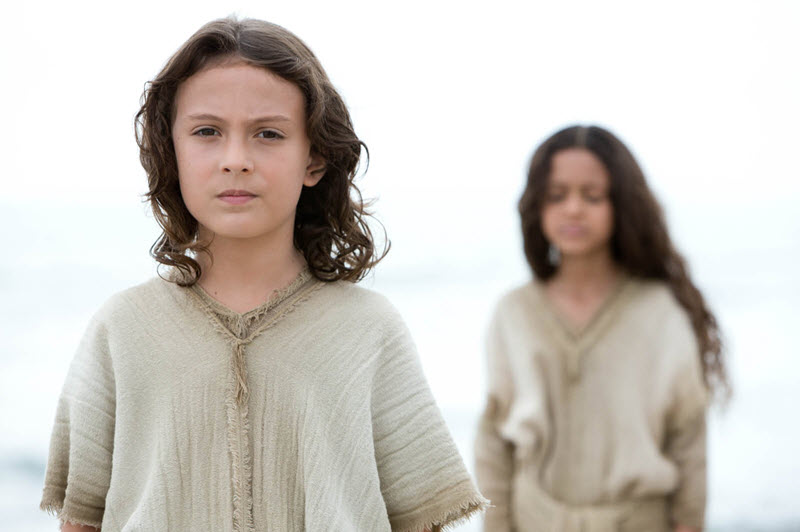


My Ratings: Moral rating: Excellent! / Moviemaking quality: 5